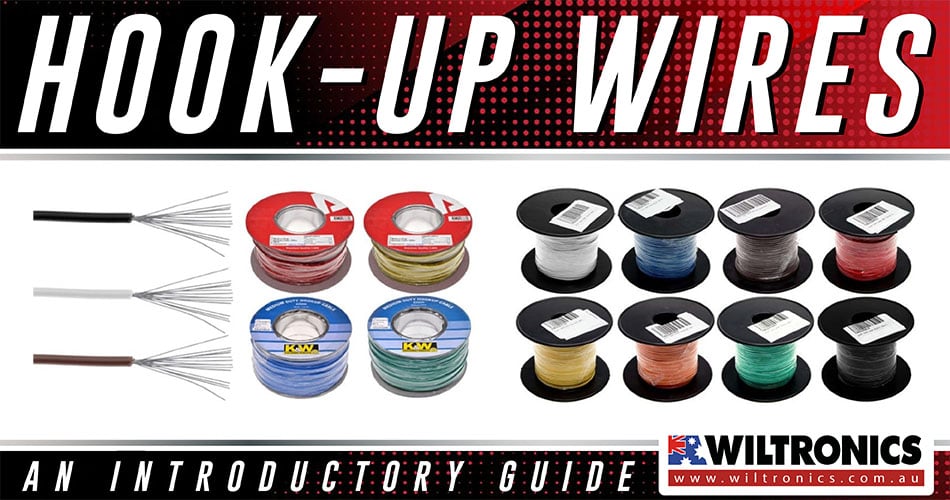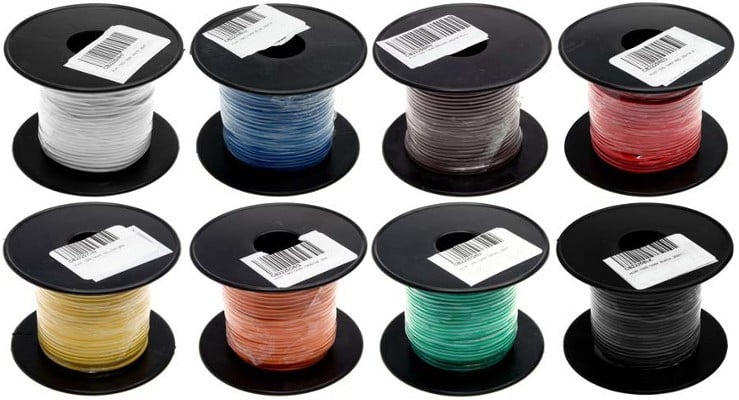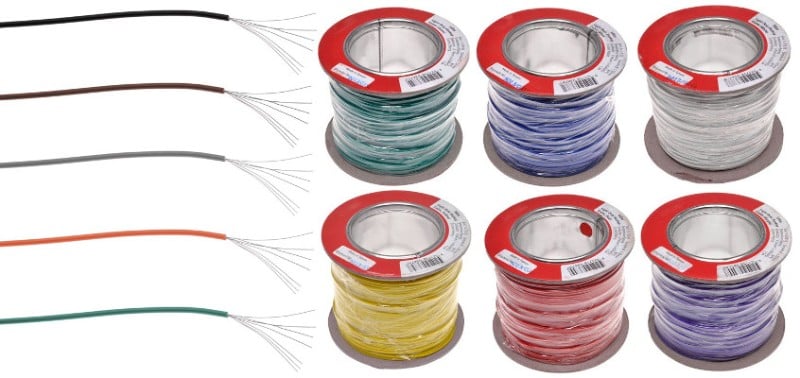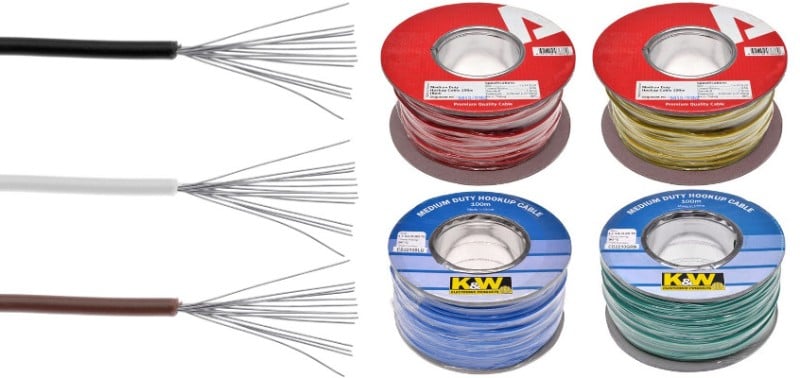The Basics of Hook-Up Wires
April 20, 2023

Ever wonder what those colourful wires are you see connecting electrical components? They are called hook-up wires, and they play a crucial role in making sure your devices run properly.
You are likely to work with this type of wire if you need wiring for an enclosed piece of electronic equipment. Hook-up wires also vary, so it helps to consider the requirements of the application.
If you are new to electronics, keep reading to learn more about them. This guide will also cover how they work and include some tips on how to choose the right wire for your project.
What Are Hook-up Wires?
A hook-up wire is a single-core insulated cable used in the internal wiring of an electronic device. It is specifically utilised in circuits, motors, transformers, switchboards and rectifiers. Also known as lead wires, hook-up wires are often classified as per their insulation material. Temperature ratings also depend on the construction.
The Working Principle
How hook-up wires work is based on the flow of electric current through a conductor. The wires are made up of a conductor and an insulating material. The conductor is usually copper or aluminium.
When an electric current flows through a hook-up wire, it travels along the conductor. It is then protected by insulation. The thickness and type of insulation can affect its resistance, flexibility, and durability. The wires are colour-coded to tell apart the different types and their functions in a circuit.
What Are Hook-Up Wires For?
Hook-up wires are ideal for low-voltage and low-current applications. They are also utilised in devices and appliances to connect components such as:
- resistors;
- capacitors;
- transistors to a power source or each other.
Hook-up wires are also used in automotive and aerospace industries for wiring harnesses. Moreover, in industrial equipment and machinery. The wire is available in a range of sizes, colours, and materials to suit many applications.
Different Types of Hook-up Wires
There is a wide variety of insulation materials available for hook-up wires, and these are:
- PVC
- PTFE
- EPDM
- Hypalon
- Neoprene
- Silicone rubber
PVC (Polyvinyl Chloride)
A PVC hook-up wire comes in 300 and 600V and is rated to withstand 105°C and many solvents, gases and oils. It is used in wire harnesses that are placed in devices that require lighting or controls. Each switch or light will need a wire connection to be turned ON and OFF.
PTFE (Polytetrafluoroethylene)
A 600V-rated single conductor wire with polytetrafluoroethylene insulation. PTFE is a tough, non-ageing, abrasion- and weather-resistant material with excellent high-temperature resistance. Ideal use for internal wiring of electronic equipment and appliances and more.
EPDM
Available in 600V and 7500V, EDPM is also known as an ethylene-propylene-diene elastomer. The EDPM wire consists of stranded tinned copper and EPDM insulation. It has excellent flexibility at high and low temperatures. Plus, a better cut-through resistance.
Hypalon
Well-known for its heat resistance, colour stability, and electrical properties. Hypalon wire consists of a stranded, tinned copper conductor and CSPE insulation. Suitable use as an appliance wire, a transformer lead, and a motor lead wire.
Note: CSPE stands for chlorosulfonated polyethylene.
Neoprene
A wire constructed using neoprene electrical insulation that provides chemical resistance. It can retain its flexibility at high and low temperatures without breaking down. The insulation material can also remain chemically stable in harsh environments. Ideal for many outdoor applications.
Silicone rubber
The silicone rubber insulation provides excellent resistance to heat, cold, moisture, and chemicals. Silicone rubber hook-up wire is also known for its flexibility and durability. This makes it easy to bend and manoeuvre in tight spaces without breaking or cracking. Commonly used in applications where high temperatures or harsh environments are present.
When Is It Necessary for Replacement?
Wires do not come with a standard life expectancy. But the insulator materials can impact how long a hook-up wire will last. PVC hook-up wires, for instance, can last up to 80 years in some cases.
Environmental factors and operational conditions are also determining causes. Regular inspection ensures they are in good condition and functioning properly. If the wires start to show signs of wear and tear or damage, replace them at once. This can include frayed or broken insulation, exposed wires, or corrosion.
Damaged hook-up wires can cause electrical shorts and can even create safety hazards. Another is if they are not rated for the voltage and current requirements. Otherwise, they can cause overheating and potentially start a fire.
What to Consider Before Buying
Again, hook-up wires come in different sizes and rated voltages. To find the suitable wire for your specific needs, consider the following before you buy:
- Conductor-related specifications:
- Material. The conductor material inside a hook-up wire is often made of copper. Copper resists corrosion and has a high thermal conductivity.
- Size. Wires with a thicker diameter can carry more current and have less resistance.
- Stranded or solid wires. Stranded conductors refer to a group of wires that are twisted together. This makes them more flexible than solid wires.
- Material. The jacket materials protect the wire and help prevent current from leaking. Feel free to refer to the types of hook-up wires listed above for reference.
- Voltage. The thickness of the insulation material can determine the rated voltage. Generally, anything requiring <1 kV is low voltage, while 1 to 36 kV and >36 kV are medium and high. Hook-up wires are best for low-voltage operations.
If you are looking for PVC hook-up wires, check out our offers below:

Light Duty Hookup Wire 13×0.12mm 25m Roll
Versatile light-duty hook-up wire, consisting of 13 strands of 0.12mm. Ideal for making internal connections inside electrical or electronic devices. Available in different colours of PVC covering.

26 AWG Hookup Wire Light Duty 7×0.16
26 AWG light-duty hookup wire which consists of 7 strands of 0.16mm. With a voltage rating of 300V AC. Sold in various coloured PVC covers and also by the metre or in 100-metre rolls.

Medium Duty Hookup Wire 14×0.20mm
Versatile medium-duty hookup wire, consisting of 14 strands of 0.20mm. With a voltage rating of 300V AC. Sold in various coloured PVC covers and also by the metre or in 100-metre rolls.
The Bottom Line
Hook-up wires are essential components in electronic circuits. Choosing the right type of wire is crucial for the proper functioning of the circuit. Get it wrong and this could lead to short circuits and damage to the components. Wiltronics is a one-stop shop for every cable and wire that you may need.
© Electrotech Brands Pty Ltd 2023


Write a Comment
You must be logged in to post a comment.